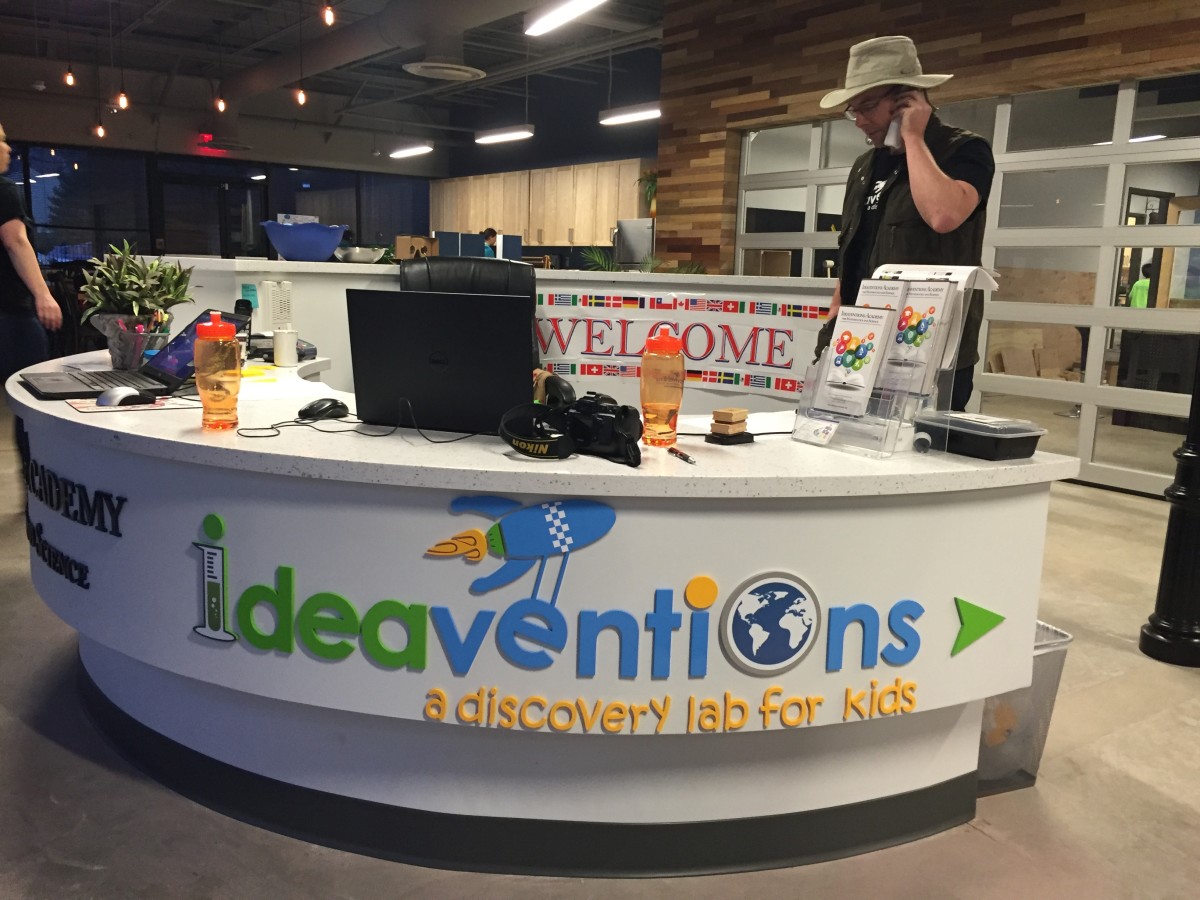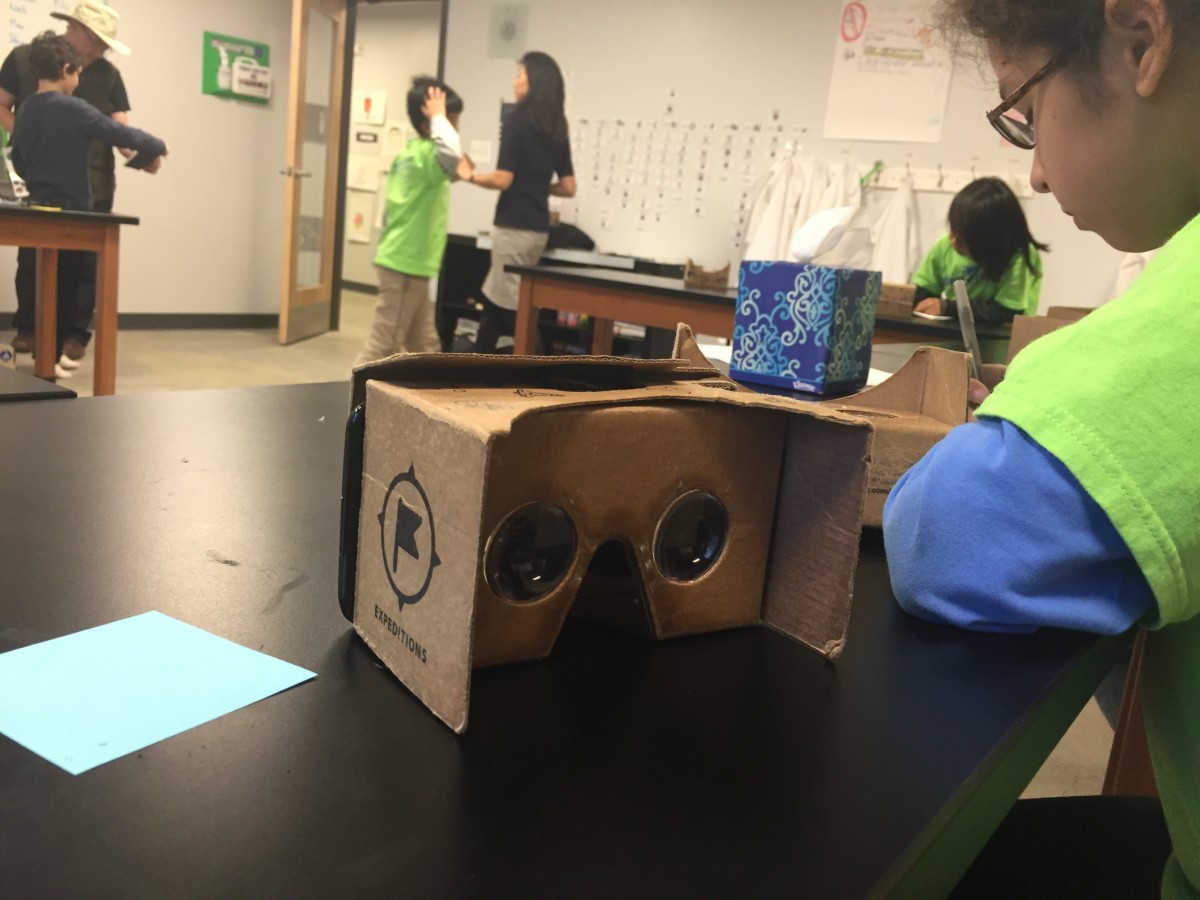Physically, they we’re in the suburbs of Reston, Va., somewhere near Dulles International. But instead of office buildings and parking lots, our attention is focused on (it must be said) a rather sad-looking coral reef.
Nine sixth- and seventh-grade students, noses pressed to their Google Cardboard headsets, twirl and wiggle in their seats as they explore their virtual environs. A tenth student, a quiet boy, leads the others around the reef via a tablet, explaining what they can see. He reveals that we’re somewhere off the coast of Hawaii.
“What kind of fish is that?” one student demands as a large fish caught in a crawl net swings into view. “I don’t know,” the ‘teacher’ admits, “But this coral reef isn’t healthy. It’s probably been dynamited.”
On Jan. 7 the Ideaventions Academy in Reston, a brand-new STEM-focused private school, took part in the Google Expeditions pioneer program. Technical.ly took a trip to the ‘burbs to check it out.
Expeditions is Google’s VR platform made specifically for the classroom — allowing teachers to take their students on immersive field trips all over the world and even, as the case may be, under the water. The Ideaventions Academy jumped at the opportunity to be a part of the pioneer program because it fits with the experimental ethos of the school.
This comes as no surprise once you meet Ryan Heitz, the founder and head of the school. Decked out in a safari hat and vest for the big day, Heitz is a passionate and energetic and earnest man.
The other reason he’s excited about Explorations, Heitz told Technical.ly, is because the pilot program offers the opportunity for his students to help mold what the project eventually becomes. Heitz feels strongly that his students become the shapers of technology, not just passive consumers.
This intent shows in many aspects of how Ideaventions teaches technology. Whether for their math classes or computer science classes or even in the humanities, the students at Ideaventions do a lot of hands-on projects. For example, the fourth- and fifth-grade students are currently working to build, and code, a Harry Potter-inspired picture of animations with embedded motion sensors to get that Hogwarts feel. It’s not entirely clear to me what this will look like when finished, but it sounds magical.
Coding in the fourth grade isn’t the only way Ideaventions is unique, though. The school was launched just last year and only has 20 students at the moment, split between a fourth- and fifth-grade cohort and a sixth- and seventh-grade cohort. Next year they’ll add on eighth grade, and Heitz told me he also has plans to expand into high school.
For that, they’ll need to move from their small-but-cozy building in a Reston office park. Heitz tells me he wanted the space to be “a fusion between a tech workplace and home.”
A quick tour confirms that many of the kids are milling around in socks, and the classrooms are named after famous inventors (think Tesla, Pasteur and Da Vinci) — yeah, it has a certain startup vibe.
Back in the classroom, the fourth- and fifth-graders and I take an expedition to the moon. Along the way we discuss things like how long it would take to drive to the moon at 60 mph (math!), why the earth doesn’t have the same types of craters as the moon (geology!) and who the first guy was to walk on the moon (history!).
In the last 40-minute period of the day, I join the sixth- and seventh-graders again for a trip to CERN (I joined late in the day so I’ve missed historic Philadelphia, the Amazon and El Capitan, among many other places). It’s been a long day, and the topic of particle physics is a little bit too abstract.
“How do you think the scientists get up from there?” one boy asks, “do they have elevators, or do they have to take the stairs?”
Oh, the things you’ll learn.
Join the conversation!
Find news, events, jobs and people who share your interests on Technical.ly's open community Slack

DC daily roundup: the DMV's VC cooldown, SmartSigns for safer driving; Rep. Schiff's AI copyright bill

Will the life sciences dethrone software as the king of technology?

Delaware tech leaders gather at White House for action summit with Biden and Harris




